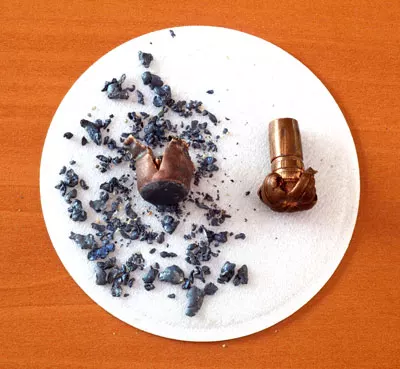Researchers call for action on lead-contaminated meat due to EHN reporting
Brian Bienkowski, Environmental Health News
Scientists from the U.S. and Europe are calling
for inspections of donated hunted meat at U.S. food banks to prevent toxic lead
exposure for children and families.
Comparison of discharged lead (left) and
non-lead (right) bullets (National Park Service)
The paper, published last month in the American Journal of Public Health, cites an EHN.org investigation that found lead fragments are a known danger in hunted meat, but most states do not inspect for possible contamination.
The reporting showed this lack of oversight
could result in potentially hundreds of thousands of lead-contaminated meals
each year, with fetuses, children and pregnant people most at risk.
There is no safe level of lead in
people’s blood. Exposure causes a range of health impacts including attention
problems, decreased IQ, increased problem behaviors, kidney disease,
preeclampsia and cardiovascular issues.
A majority of hunters still use lead
ammunition — though alternatives exist — and animals killed with lead bullets
can contain fragments of the metal. The amount of contamination depends on the
type of gun and bullet, whether the bullet hit the animal’s bones, and whether
or not the meat is ground. (In Minnesota, where state officials actually test
donated hunted meat for lead, most lead contamination has been found in ground
venison).
Reporter and University of Pittsburgh School of Public Health doctorial student and researcher Sam Totoni conducted the original investigation for EHN.org and also led the new call-to-action paper. Totoni and coauthors also pointed to the environmental injustice implications of this lack of testing.
Lacking food safety standards
The authors acknowledge the benefits of
donated hunted meat, but point out that there is nearly no oversight to ensure
the safety of this type of meat at food banks across the U.S.
Most states have adopted the FDA Food Code, which
doesn’t address donated food. As a result, people who shop in grocery stores
are protected from adulterated food that contains tiny pieces of metal, while
people who receive donated food are not.
“An underlying lack of food safety
standards for adulterated donated food increases risks to low-income
recipients, who are already disproportionately affected by elevated blood lead
levels,” Totoni and colleagues wrote in their new report.
Industry pushback
The overwhelming scientific consensus is
that hunters should not use lead bullets. A 2016 review found that of 570
scientific articles on lead ammunition, 99% raised concerns about its toxic
impacts on health and the environment.
However, there is a concerted effort by
the firearm industry and affiliated groups to push back against regulation and
promote the continued use of lead ammunition. Totoni outlined the extensive science denial and
misleading tactics by these groups in follow-up reporting last
year.
“Despite the well-established scientific
basis for regulation of lead ammunition for hunting, the topic has been
politicized by misinformation campaigns portraying concerns about ingesting
lead ammunition as a product of antihunting agendas,” the authors wrote in the
new report.
A model for testing hunted meat
Despite the lack of national food safety
regulations for donated food, Minnesota provides a model to protect recipients
of donated hunted meat: The state’s Department of Agriculture has an annual
inspection program of hunted meat, which is financed by tacking an extra dollar
on the sales of some hunting permits. Between 2014 and 2019, the state
discarded about 9% of hunted meat packages annually because they found evidence
of lead contamination via x-ray.
While such state programs could prevent
people — which largely are low-income consumers — from eating lead, “the most
reliable form of primary prevention from lead-adulterated meat is the
consistent use of nonlead ammunition for hunting,” the authors wrote.
“This public health issue extends beyond
donated meat to millions of Americans in the hunting community, who regularly
consume meat from game harvested with lead ammunition. We call for primary
prevention actions to address this neglected environmental justice problem.”
See the full paper at
the American Journal of Public
Health.